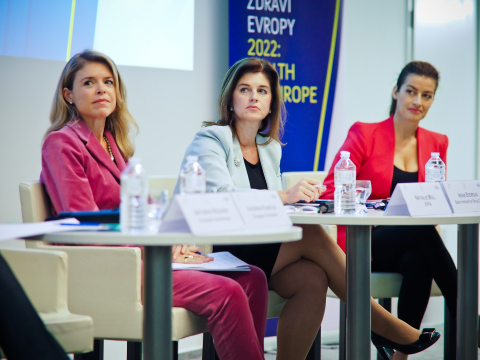Looking back at the conference "Pharmaceutical Strategy for Europe - Implementation, Successes, Challenges."

On 30 September 2022, the Association of the Innovative Pharmaceutical Industry (AIFP), under the auspices of the Czech Presidency of the Council of the EU, organized an international expert conference on the current topic of the Pharmaceutical Strategy for Europe. The conference follows a similar international meeting organized in June 2022 in cooperation with the Health Committee of the Senate of the Parliament of the Czech Republic under the auspices of its Chair, Roman Kraus.
The conference was attended by more than 100 participants, including the Permanent Representatives to the European Union, representatives of the European institutions, the Czech state administration, the patients and professional community, and the innovative pharmaceutical industry. "The aim of the meeting was to deepen the understanding of the needs of the different parts of the healthcare system and thus help to define a new legislative framework that is to be sufficiently robust, sustainable, and balanced in the long term," says Mgr. David Kolář, Executive Director of AIFP.
The revision of the European pharmaceutical legislation based on the Pharmaceutical Strategy for Europe is one of today's most important European health topics. The new legislation will significantly impact the provision of healthcare services and the availability of modern medicines for European patients for many years to come. At the same time, it may weaken or strengthen Europe's position in the global medicines market. The latter has been gradually deteriorating in recent years, with innovative medicines now accounting for only 22% of the total, compared with 48% in the US.
The revision of the pharmaceutical legislation also aims to build a resilient medicines supply system for future crises and to ensure that the production, distribution, and use of medicines have the lowest possible impact on the environment, still within a financially sustainable system.
Speakers at the conference:
- Jakub Dvořáček (Ministry of Health, Czech Republic),
- Antonios Rodiadis (European Commission),
- Kateřina Konečná (European Parliament),
- Irena Storová (State Institute for Drug Control, the Czech Republic),
- Nathalie Moll (European Federation of Pharmaceutical Industries and Associations, EFPIA),
- Sini Eskola (EFPIA),
- Ansgar Hebborn (EFPIA),
- Pavel Sedláček (AIFP) and
- David Kolář (AIFP).
Affordable medicines for patients and Europe attractive for research and development
The speakers' presentations and the discussion underlined the importance of the new pharmaceutical legislation and identified weaknesses. They highlighted the need for all stakeholders to work together to find ways to find a compromise solution. Speakers agreed that the goals set by the legislation are achievable but differed in the proposals on how to reach them.
In general, it will be critical to strike a balance between the requirement to make the European Union as attractive as possible for investment in research and development of new medicines, which is linked to the pharmaceutical incentive system, and the protection of intellectual property rights on the one hand. On the other hand, the requirement for rapid access to new treatments for patients in the EU Member States is determined by European legislation, the different market entry conditions in EU countries, and their economic situation.
Panelists agreed that striking a balance between these requirements will be an essential factor for the success of the legislation and will require an open and responsible approach from both the political representation and the industry. It is vital that patient representatives, whose role is indispensable, are also invited to the discussions.
European Health Data Space
Part of the discussion was also devoted to the European Health Data Space (EHDS), which aims to improve and accelerate healthcare delivery across the EU through, among other things, its gradual digital transformation. However, the EHDS is also intended to help accelerate research into new therapies in the EU and contribute to a more accurate and cost-effective assessment of the health benefits of new technologies and medicines for the EU population.
The speakers agreed that the new Health Technology Assessment (HTA) regulation, which is now being implemented, can be relied upon. The regulation should speed up patient access to new technologies, including medicines, and refine the assessment of their benefits.
What was said at the conference …
Antonios Rodiadis: „Goal is to pass the revision of the EU Pharmaceutical Legislation with the current European Parliament."
Jakub Dvořáček: „IP protection works."
Nathalie Moll: "Revision of the EU Pharmaceutical legislation is an opportunity to create a globally competitive policy ecosystem fostering innovation in Europe."
Pavel Sedláček: "Partners can disagree, but it is necessary to listen to each other. Industry came with different proposals and is ready for a comprehensive discussion."
The promise of the pharmaceutical industry
The pharmaceutical industry is well aware of its share of responsibility. That is why Nathalie Moll, Director of EFPIA, presented some concrete proposals that will contribute to making innovative medicines more accessible to European patients. These include a commitment to file pricing and reimbursement applications in all EU countries no later than 2 years after EU market authorization, where national systems allow, the introduction of a database with industry information on the status of new product launches, and, last but not least, a proposal for differential pricing based on the economic possibilities of each EU Member State.
A prerequisite is maintaining the existing IP protection system and extending the pharmaceutical incentives. "The pharmaceutical industry is ready for further discussions. Our priority is timely access to medicines for all patients who need them, and Europe attractive for research and development of new medicines, at the same time”, David Kolář concludes.
The record of the conference available here






